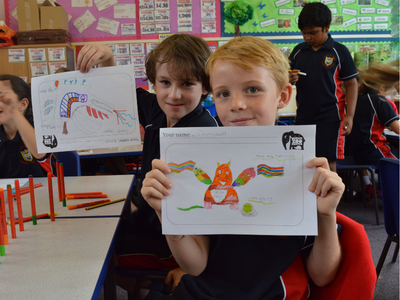“My child hates writing.” What do I do?


“My child hates writing” is a phrase we hear a lot from parents who are yet to find an effective way to transform their child's attitude to writing. Building strong writing skills as a child is very important, as being a capable writer will be valuable in all stages and walks of life.
Teaching your child to write and explaining why it's important can be challenging, especially if they aren't the biggest fan of putting pen to paper. We’re here to help you through this issue and transform your reluctant writer into a budding young author.
Power up your child's writing skills with Night Zookeeper, A fun gamified approach to practice writing!

Your child will create magical animals and power them up through reading & writing activities such as exciting games, interactive lessons and skill challenges. Our team of qualified tutors will give them constructive, personalized feedback on their writing to hone their craft, and we send you monthly printable worksheets for handwriting practice.
Here are our top tips on how to get your child to love writing:
1. Explore why your child feels this way toward writing.
Some children are naturally resistant to learning in general. However there may have been a specific event that triggered these negative feelings toward writing specifically. It can be as simple as a failed test, the inability to complete a certain writing assignment, or not being able to perform the physical act of writing. It can also stem from a more profound root cause, such as dyslexia, ADHD and other forms of SEN. Getting to the source of the problem is key to addressing it.
Direct communication with your child is always the best first step. It’s important to show your child that you value their opinions and understand their feelings. You can ask them why they dislike writing and how they’d like to tackle this obstacle. We know that this may seem like a difficult discussion, but you are likely to find this extremely helpful.
Once you’ve gathered a good understanding of why your child feels this way toward writing, you can start brainstorming ways to tackle this obstacle and help your young learner. Perhaps they need to focus on their fine motor skills before moving onto writing a whole piece, or maybe they simply need simple, step-by-step guidance from someone they trust on how to create a piece of writing.
2. Show them the joy of writing!
Children will often look up to you as a role model and are also likely to mimic your actions, so use this to your advantage to help your child embrace writing by simply demonstrating just how fun it can be!
Why not start writing a storybook with your child? Or start journalling when your child is around? This could be especially effectively outside of learning time - perhaps in the evening, as part of your family’s night routine.
3. Encourage reading to build writing skills
Before diving into writing, it's important to recognize the power of reading in developing writing skills. Reading exposes your child to new vocabulary, ideas, and story structures, laying a solid foundation for their own writing journey.
When children read regularly, they naturally absorb:
- Diverse vocabulary and language patterns
- Different writing styles and techniques
- Story structures and plot development
- Character development and world-building
Your child should become familiar with different writing genres and styles before creating their own pieces, as this will help them understand how texts are crafted and give them inspiration for their own writing!
You can encourage your child to read by:
- Setting aside dedicated reading time
- Discussing books together
- Visiting the library regularly
- Letting your child choose books that interest them
Remember, a child who reads often is more likely to become a confident writer. By fostering a love for reading, you're indirectly nurturing their writing skills and creativity!
4. Incorporate writing into daily tasks.
There are many ways to incorporate writing into everyday activities. For example, ask your child to write down the weekly shopping list while you say aloud the items you need - or allow them to try writing this list using their own words! This will take focus away from the writing process by encouraging your child to focus on the idea that they are helping their parent, creating a positive emotional connection between them and the act of writing something, while also giving them a sense of achievement.
5. Create a rewards system.
A writing tracker or table could be a great way to motivate your reluctant writer to work on their writing skills! Not only will this create a clear goal for your child to achieve, but it’ll also set clear standards for their written work and give them instructions on how to get rewarded!
Whether you’re looking to get your reluctant writer to work on their penmanship, correct spelling or simply trying to encourage them to use their imagination more actively, creating a reward system often speeds up their progress, and it’s something we highly recommend!
6. Teach your child that writing can be liberating!
Writing can be freeing, as it improves self-expression, self-confidence and independence. Writing doesn’t have to be boring, or purely used in an educational setting. Your child can write about anything - from keeping a diary, to blogging, to even participating in creative writing competitions!
Writing can truly become your child’s best friend! Sometimes verbal self-expression is difficult, and there are times where we don’t want to share our thoughts and feelings with others, so writing can be an extremely freeing activity. Encouraging your child to write as a medium to express how they feel can be a great "way in" to writing.
7. Share your child’s writing.
Something that is usually a very effective way to motivate your child to write is to share your child’s work with family, friends or in a safe space online. By sharing your child's writing, it tells them that their writing can be valued by or meaningful for others, which can contribute to their confidence and self-belief!
Sharing printable copies of your child’s written work with others or creating personalized books that heavily feature your child’s writing is another wonderful way to inspire them to keep working hard.
8. Make writing fun for your child!
Another thing you can do to inspire your child to want to write is to get your reluctant writer to draw a specific setting or character. Once they’re done with their drawing, encourage them to write about it - this can be a description of what they’ve created or a story that incorporates the character or setting in the drawing. This may make it a little less challenging to convince them to write, as some of the creative work that goes into writing has already been completed in a visual way.

There are endless ways to encourage your child to give writing a go! These include verbal discussions, board games, workbooks, printable materials, outdoor activities and online writing programs, such as Night Zookeeper! We’ve witnessed the power of alternative approaches to writing and they can really make a difference in terms of how your child feels about writing.
Follow us on social media


Make Reading & Writing Fantastically Fun!
- Award-winning reading & writing program for kids
- Improves spelling, grammar, punctuation & vocabulary
- Over 1,000 different learning games and activities


Benefits of Storytelling in Child Development


How to Help Your Preschool Child Develop Pre-Writing Skills


Creative Writing for Kids: A Step-By-Step Guide to Writing a Story


